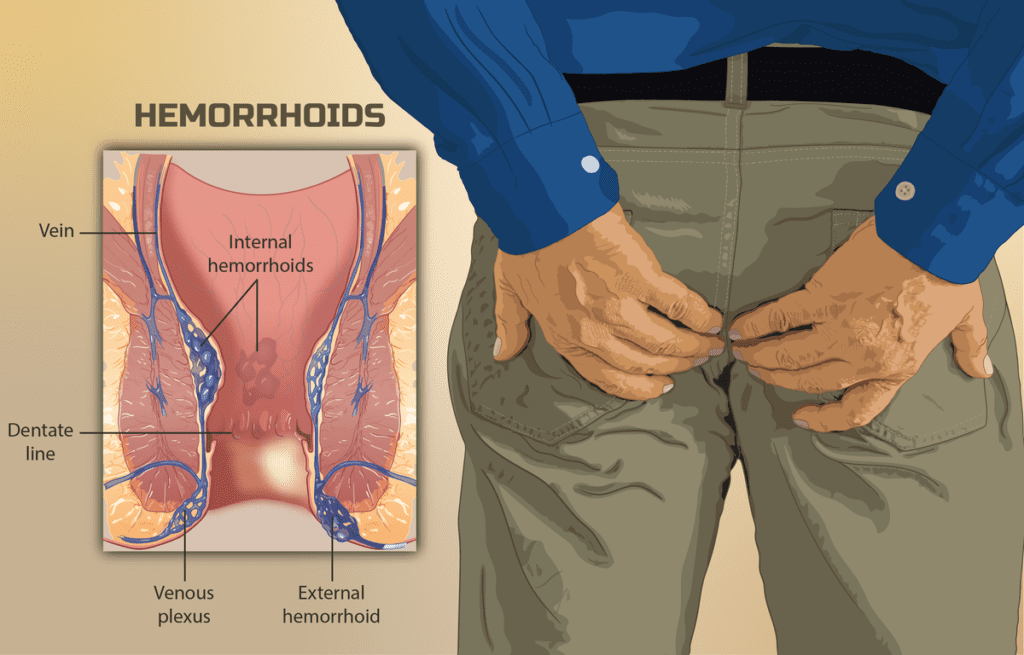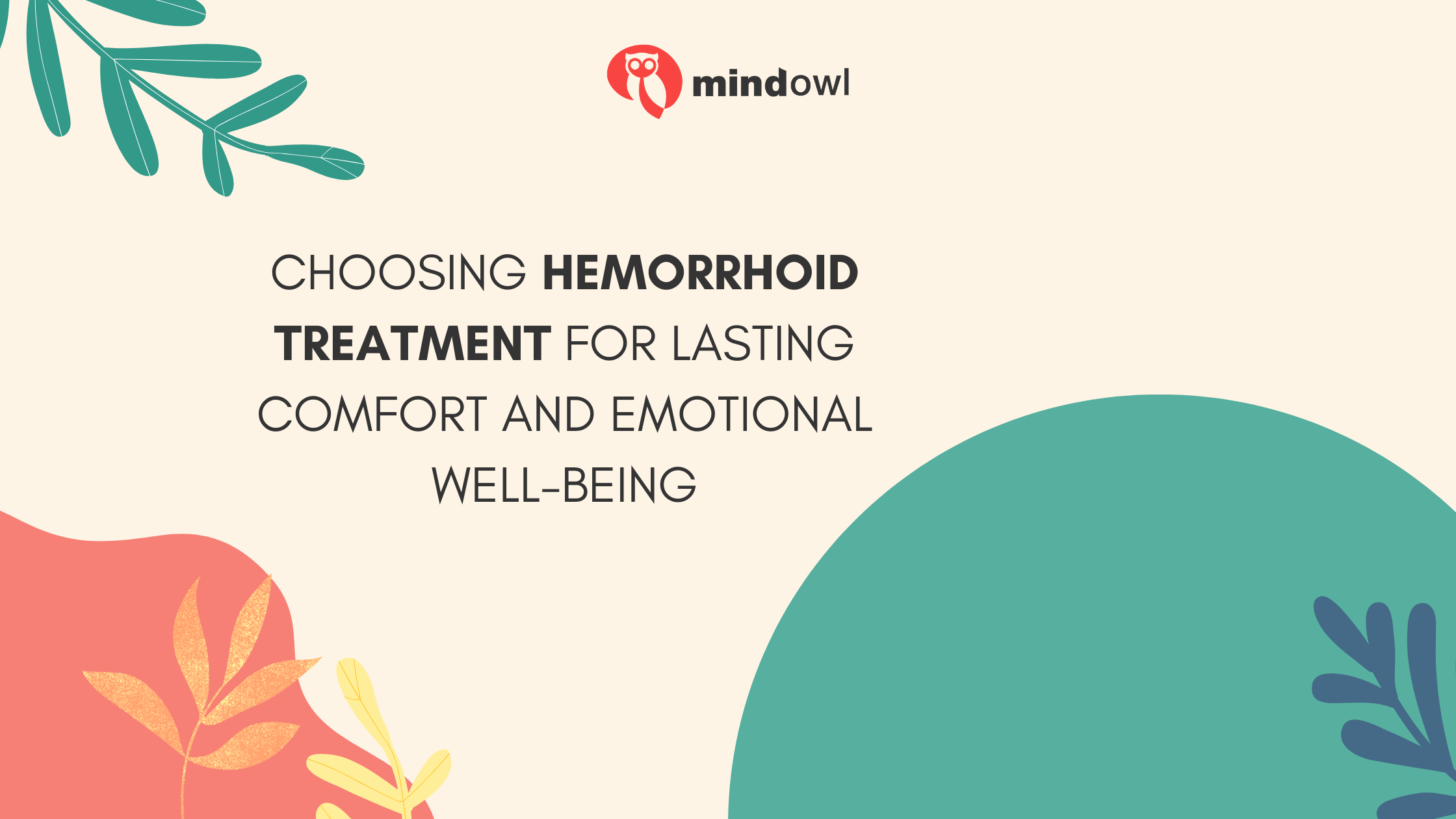Hemorrhoids are a common yet often misunderstood condition. They can cause physical discomfort, sometimes significant pain, and are frequently accompanied by feelings of embarrassment, anxiety, and even isolation. While many people find it difficult to talk about hemorrhoids, it’s important to recognize that they affect millions of individuals worldwide. Whether internal or external, hemorrhoids can disrupt daily routines, making activities like sitting, walking, or even going to the bathroom challenging. Beyond the physical symptoms, the emotional toll can be just as significant, impacting self-esteem, social interactions, and overall mental health.
A truly effective hemorrhoid treatment addresses not just the physical discomfort but also supports emotional well-being. The right approach can help reduce pressure, ease inflammation, and restore comfort—while also addressing the stress, anxiety, and isolation that often accompany this condition. In this article, we’ll explore how to choose the best hemorrhoid treatment for lasting comfort, with mindfulness and mental health at the heart of the process.

Understanding the Emotional and Physical Impact
Hemorrhoids are more than just a physical inconvenience. They can also have a significant impact on mental health. Many people feel ashamed or embarrassed, which can lead them to avoid seeking help or discussing their symptoms with others. This silence can result in feelings of isolation and may even contribute to anxiety or depression. Recognizing the emotional impact is the first step toward holistic healing.
Physical symptoms vary from person to person. Some experience internal pressure and discomfort that worsens during certain activities, such as lifting heavy objects or sitting for long periods of time. Others notice visible swelling or irritation, particularly after long periods of standing or straining. The unpredictability of these symptoms can add to the stress, making it difficult to plan daily activities or maintain a sense of normalcy.
Mindful Tip:
Practice being mindful of your symptoms. Notice not just the physical sensations, but also how they affect your mood and stress levels. Persistent discomfort may signal a deeper issue, while brief irritation could be linked to daily habits or emotional stress. Paying attention to both your body and your emotions can help you gain a clearer understanding of your condition and its triggers.
Aligning Care with Your Daily Routine and Stress Levels
For long-term success, it’s essential to find a hemorrhoid treatment that fits seamlessly into your life. Some treatments require multiple applications throughout the day or significant lifestyle changes, which can be overwhelming, especially if you’re already experiencing stress or anxiety.
Mindful Tip:
Integrate mindful moments into your routine. Simple practices like deep breathing, short meditations, or gentle movement can help reduce stress and support your body’s natural healing process. If your discomfort increases during work, travel, or long commutes, choose a treatment that supports your comfort without interrupting your day. Remember, consistency is key, and a manageable treatment is more likely to be effective.
Consider how your daily activities and emotional state may influence your symptoms. For instance, stress can worsen inflammation and pain, so it’s crucial to manage your physical and mental well-being. Aligning your treatment with your lifestyle and emotional needs can create a sustainable path to relief.
Tracking Your Body’s and Mind’s Response
Lasting results often begin with paying attention to the small details. An effective treatment should lead to reduced swelling, less irritation, and easier movement within days. However, it’s equally important to pay attention to your emotional state.
Mindful Tip:
Keep a mindful journal to track physical symptoms and emotional responses. Note any changes in your comfort level, mood, or stress levels throughout the day. Even slight improvements in posture or rest type can indicate progress. This awareness will help you fine-tune your approach and build lasting comfort.
Tracking your responses also allows you to identify patterns and triggers. For instance, you might discover that your symptoms worsen during periods of high stress or after particular activities. Recognizing these patterns enables you to make more informed choices about your care and take proactive steps to manage your physical and emotional well-being.
Avoiding Quick Fixes—Embracing Mindful Healing
It’s tempting to seek out quick fixes for discomfort in our modern, fast-paced world. While over-the-counter creams and ointments may provide temporary relief, they often fail to address the underlying cause of hemorrhoids. Repeated use of these quick fixes can create a cycle of fading and recurring symptoms, which increases frustration and stress.
Mindful Tip:
Focus on gradual, mindful healing rather than chasing instant results. Practice self-compassion and patience, recognizing that true comfort comes from supporting your body’s natural healing process. Make lifestyle changes that promote long-term health, such as increasing your fiber intake, staying hydrated, and exercising regularly.
Mindful healing also means being gentle with yourself. Hemorrhoids are a common condition, and having them does not reflect your worth or hygiene. Approaching your treatment with kindness and understanding can reduce the emotional burden and foster a sense of empowerment.
Seeking Reliable, Supportive Resources
With so many products and remedies available, navigating the world of hemorrhoid treatments can be confusing. Online sources that provide structured information and access to supportive communities can help clarify your options and reduce feelings of isolation.
Mindful Tip:
Engage with platforms that allow you to compare experiences and learn from others. These communities can provide emotional support and practical advice, helping you feel less alone. Look for resources that emphasize evidence-based information and avoid exaggerated claims.
Professional guidance can also be invaluable. A healthcare provider can help you identify the best treatment options for your needs and reassure you that you’re not alone. Don’t hesitate to reach out for support, whether from a medical professional, trusted friend, or online community.
Nurturing Both Body and Mind
The right hemorrhoid treatment aligns with your body’s signals, providing steady physical and emotional comfort. Selecting a treatment that matches your symptoms and lifestyle can minimize recurring discomfort and promote long-lasting relief.
Mindful Tip:
Remember, hemorrhoids are a common and treatable condition. Practicing mindfulness and self-compassion can help you navigate discomfort with greater ease and confidence. Incorporate relaxation techniques, such as meditation or gentle yoga, into your daily routine to support your physical and emotional well-being.
Addressing the emotional impact of hemorrhoids and integrating mindful practices into your treatment plan allows you to take a more balanced, holistic approach to healing. This improves your physical comfort and enhances your overall quality of life.
Additional Mindful Strategies for Hemorrhoid Relief
To support your journey toward lasting comfort and emotional well-being, consider the following mindful strategies:
- Deep breathing exercises:
- Take a few moments each day to focus on your breathing. Deep, slow breathing can reduce stress, promote relaxation, and ease physical discomfort.
- Guided Meditation:
- Use guided meditations designed for pain management or stress reduction. These meditations can help you cultivate a sense of calm and resilience in the face of discomfort.
- Gentle Movement:
- Engage in gentle activities like walking, stretching, or yoga. Movement improves circulation, reduces tension, and supports overall well-being.
- Mindful Eating:
- Pay attention to your diet and focus on foods that support digestive health. Increasing fiber intake and staying hydrated can help prevent constipation, a common trigger for hemorrhoids.
- Self-Compassion Practices:
- Remind yourself that having hemorrhoids is not your fault. Practice positive self-talk, and treat yourself with the same kindness you would offer a friend.
Building a Supportive Environment
Creating a supportive environment is essential for both physical and emotional healing. Surround yourself with understanding individuals who can offer encouragement and practical help. If you feel comfortable, share your experience with trusted friends or family members—you may be surprised by how many people have faced similar challenges.
Online forums and support groups can also provide a sense of community and reduce feelings of isolation. Engaging with others who understand your experience can be incredibly validating and empowering.
Professional Guidance and When to Seek Help
While many cases of hemorrhoids can be managed with self-care and mindful practices, it’s important to know when to seek professional help. Consult a healthcare provider if your symptoms are severe, persistent, or accompanied by significant bleeding. They can offer personalized treatment options and rule out more serious conditions.
A healthcare professional can also provide reassurance and guidance, helping you navigate the emotional challenges associated with hemorrhoids. Don’t hesitate to reach out for support—your well-being is important.
Conclusion: A Holistic Approach to Hemorrhoid Relief
True relief from hemorrhoids requires addressing the condition’s physical and emotional aspects. Embracing mindfulness, managing stress, and seeking supportive resources can help you achieve lasting comfort and emotional well-being. Remember, you are not alone in this experience. With the right approach, you can confidently and compassionately navigate this challenge.
Take each day as it comes, practice self-care, and trust your body’s ability to heal. With patience, mindfulness, and support, you can find the relief and peace you deserve.
MindOwl Founder – My own struggles in life have led me to this path of understanding the human condition. I graduated with a bachelor’s degree in philosophy before completing a master’s degree in psychology at Regent’s University London. I then completed a postgraduate diploma in philosophical counselling before being trained in ACT (Acceptance and commitment therapy).
I’ve spent the last eight years studying the encounter of meditative practices with modern psychology.

